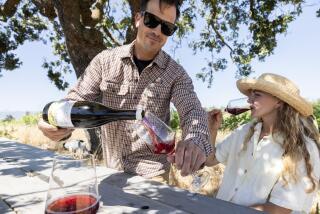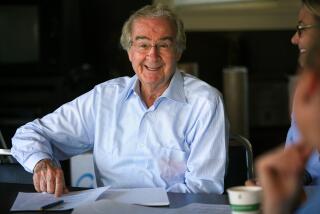Emile Peynaud, 92; Transformed Postwar Winemaking in Europe
- Share via
Emile Peynaud, considered the father of modern enology in his native Bordeaux, France, and a wine expert lauded for his refined research and down-to-earth writing, has died. He was 92.
Peynaud died July 18 at his home in Talence, France, after a long struggle with Parkinson’s disease.
Growing up surrounded by the fertile soil and climate of Bordeaux, Peynaud began working in the laboratory of Calvet wineries when he was 14 and remained for two decades. While working, he managed to earn a doctorate at Bordeaux’s Viticulture Institute -- later known as the University of Bordeaux.
His doctoral research enabled him to explain malolactic fermentation -- the process by which the harsher malic acid in wine is converted into milder lactic acid.
His instruction to winemakers in what he simplified to “second fermentation” helped revolutionize winemaking.
Peynaud spent World War II as a Nazi prisoner of war, working on a German farm and studying the best way to taste, smell and evaluate balance in wine -- lessons he would share the rest of his life.
He would come to be considered by many as the most influential figure in transforming winemaking practices in postwar Europe.
Although some critics jeered at the “Peynaudization” of Bordeaux, he was credited with converting hundreds of wineries in France, Italy, Spain and Portugal to modern premium standards.
From 1949 until his retirement in 1986, Peynaud conducted research, taught and became dean of oenological studies at the University of Bordeaux.
Until 1977, he conducted “Monday seminars,” teaching generations of winemakers the ground rules for creating and tasting wine.
Since retiring from academe, Peynaud practiced what he was best known for -- consulting -- and helped Chateau Margaux perfect the art of claret.
Ruddy and approachable, Peynaud began advising local vintners in the late 1940s when he rode around Bordeaux on his bicycle.
After a heat wave caused accidents with the 1959 harvest, he was able to help winemakers recover by showing them how to select better grapes, control temperatures during fermentation and maintain strict cellar hygiene.
Coupling his clarity with acknowledged authority, Peynaud wrote hundreds of articles and several books, including the influential “The Taste of Wine” in 1980 and “Knowing and Making Wine” in 1982.
After the latter was translated into English, Nathan Chroman praised the book in an “About Wine” column in The Times in 1985.
Peynaud, he related, walked readers through four phases of wine tasting: observing through the senses, describing what is perceived, comparing the perceptions with known standards and judging the wine.
“For drinking to become tasting,” Peynaud stated, “it often only requires a little effort of concentration and an analysis of impressions perceived.”
Although Peynaud conversed in French and had a Frenchman’s reverence for the importance of a region’s soil, subsoil and climate in wine production, he was open-minded about winemaking outside the country.
“There are still viticultural sites to discover” throughout the world, he once said, and rated some of California’s chardonnays that had been aged in Burgundian oak as “pure marvels.”
Peynaud is survived by his wife, Yvonne; two children; and five grandchildren.
More to Read
Sign up for Essential California
The most important California stories and recommendations in your inbox every morning.
You may occasionally receive promotional content from the Los Angeles Times.













